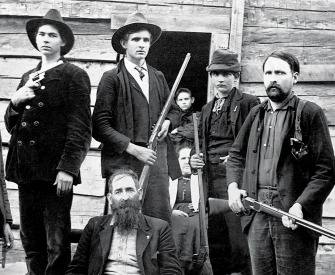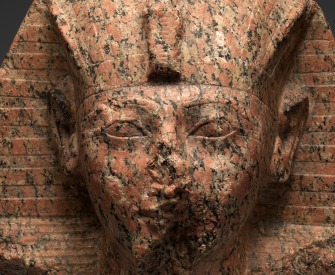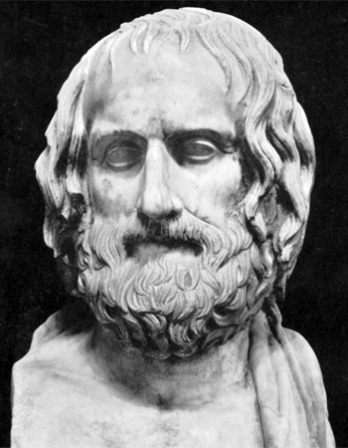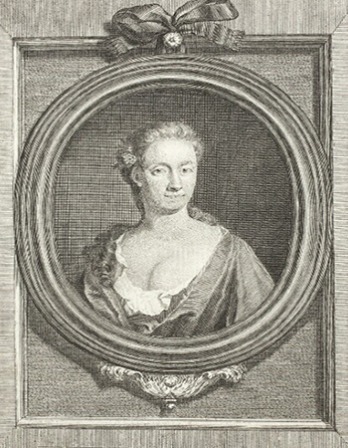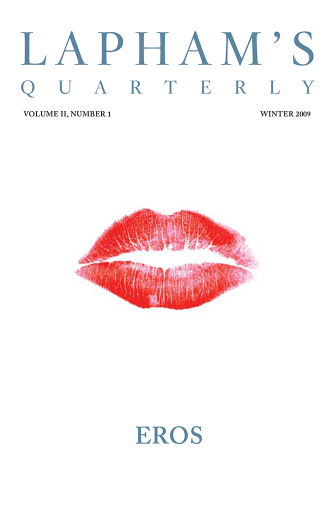The strength of a family, like the strength of an army, is in its loyalty to each other.
—Mario Puzo, 2001The Meaning of Home
The Misfits, Arthur Miller’s drama about disconnected strangers escaping to the West, established a new kind of American family.
By J.M. Tyree
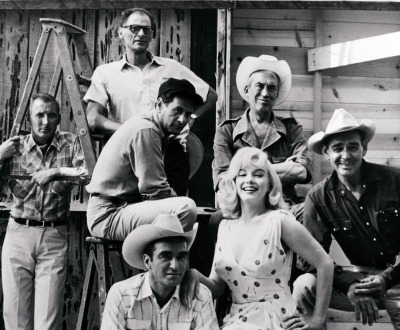
The title of Arthur Miller’s first book, Situation Normal (1944), alluded to a well-known saying in the army—Situation Normal: All Fucked Up (SNAFU)—but it might be applied more widely to Miller’s view of American life in general and American family life in particular. It’s true that Philip Larkin used the same vocabulary to describe English families—“They fuck you up, your mum and dad”—but Miller saw tragedy, not just humor, in the postwar American scene. Perhaps no major writer understood better than Miller why America could not be one happy family. In his plays of the late 1940s and early 1950s, Miller depicts the postwar nuclear family in a state of fission. His characters in All My Sons, Death of a Salesman, and A View from the Bridge suffer from a kind of psychological radiation sickness, invisible but deadly. War profiteers, failed businessmen, and dockworkers kill themselves or get killed over secrets they cannot bear to admit to their families or themselves. Foul deeds rise in the collective consciousness of a nation that erases and repeats its history—another way of saying that the sins of the fathers and mothers will be visited on the sons and daughters and unto the generations.
What vexed Miller were the stories Americans have told themselves about the power of positive thinking, the instant money and spiritual purity that are sure to follow from unfettered entrepreneurship, the decency of the profit motive, the goodness of the national past, and, when all else fails, the possibility of escape and reinvention in the West. This land is your land: Henry David Thoreau crosses uneasily with Norman Rockwell; the tenets of Ayn Rand crash into the gospel of Jesus Christ; the Book of Mormon reads strangely in parallel with the Bill of Rights; Huckleberry Finn lights out for the territory but never becomes the Marlboro Man, exactly. Above all, Miller responded to a culture that cherished a sanctimonious and noxiously sentimental vision of family life as a beacon of health and wealth.
Yet it’s clear from Miller’s screenplay for John Huston’s movie The Misfits—a film celebrating its fiftieth anniversary this year—that Miller didn’t see the American family as a problem that had an answer. Flee the traps of family life on an Eastern stage, and you might find yourself wandering lost and mangled in a film set in the deserts of Nevada, atomized and disconnected, drifting among strangers from divorce court to highway to rodeo to whiskey bottle to bed with fast friends. The myth of the family and the myth of self-reliance—how does the same culture hatch two such irreconcilable dreams? Miller’s characters are always being crushed by conflicting motives and impulses, forced into impossible situations by self-delusions or the repression of past betrayals. In his Eastern plays, blood relations doom one another, acting like planets circling closer and closer to moral black holes. In the movie script that heralded the end of his marriage to Marilyn Monroe, absolute freedom from family ties in the West appears to be another kind of American disaster—one papered over with a Hollywood ending.
During the 1940s and 1950s, American family drama flowered in the works of Miller, Tennessee Williams, the final plays of Eugene O’Neill. Williams’ The Glass Menagerie, said to draw upon his own family’s life, opened in 1945, while O’Neill’s posthumous masterpiece of filial horrors, Long Day’s Journey Into Night, premiered in 1956. Miller’s most important plays fall into the years between these two dates, a golden age for American theater. The postwar scene may have been influenced more generally by the popular acceptance of Freudian philosophy, but the stage has always been a logical location to look in on houses and families. It is finely attuned to those confined spaces in which audiences witness relationships imploding and kinship unraveling. The meaning of home as a place where the disasters of one generation haunt the next applies to many classics of world theater, including more modern masterpieces such as Henrik Ibsen’s Ghosts (1882) and Anton Chekhov’s The Cherry Orchard (1904), never mind the ancient but actively volcanic source material in tragedies like Hamlet or Oedipus Rex.
The Natchez, by Eugène Delacroix, 1835. The Metropolitan Museum of Art, Purchase, Gifts of George N. and Helen M. Richard and Mr. and Mrs. Charles S. McVeigh and Bequest of Emma A. Sheafer, by exchange.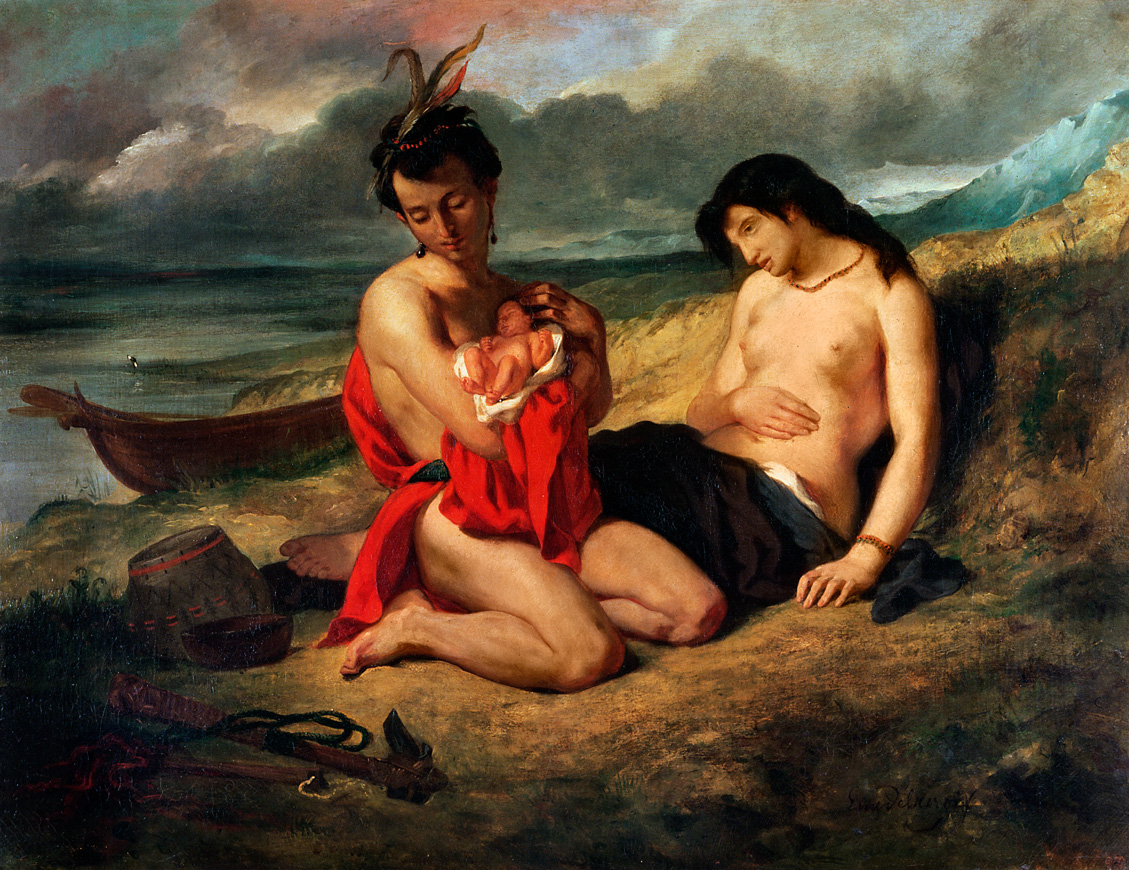
“It don’t excuse it that you did it for the family,” Kate tells her husband Joe Keller in All My Sons (1947). “It’s got to excuse it!” Keller says. He has been lying to everyone around him—including himself—about selling defective airplane parts to the Army Air Force during World War II. After twenty-one pilots die in the botched planes, Keller is arrested and briefly jailed but successfully pins all the blame on his business partner, Steve Deever. But murder will out, and the repressed crime of the father is visited upon Keller’s sons: Larry, believed missing in action in the Pacific, has in fact committed suicide after reading about his father’s conviction for the death-trap airplanes in the papers; Chris, meanwhile, gradually discovers the truth about his dad while romantically pursuing Ann Deever, the daughter of Steve, Keller’s business partner. Betrayals, public and private, personal and national, lurk underneath American cultural triumphalism. By the end of the play, Keller has understood the idea of family in a larger sense, finally claiming as his own the young men killed by his shoddy merchandise: “They were all my sons.” The idea that there might be some alternative—a “Family of Man,” to borrow the title of Edward Steichen’s 1955 exhibition of photographs from around the globe at The Museum of Modern Art—resonates with the metaphor in the title of Miller’s play.
Recognition of long-suppressed truths hits Miller’s families not in the self-help mode of Dr. Phil but in the old styles of
William Shakespeare or Euripides. Miller’s sons—Larry and Chris in All My Sons, Biff and Happy in Death of a Salesman (1949)—sometimes attempt to escape claustrophobic houses haunted by trauma, old ghosts, secrets, and lies, but they rarely leave the nest for long, and then only to fail, or die, or return to learn unbearable truths about their fathers. The children can sing in their chains or struggle in their traps, while their mothers grieve. In these plays, Miller’s mothers, for their part, are fatally strong, not simply all-suffering—they are actively complicit in the tragedies that unfold. At the end of All My Sons, Kate advises Chris, “Forget now. Live.” Good luck with that. In Death of a Salesman, Linda Loman torments herself with an ending the ancient Greeks might have appreciated: “I made the last payment on the house today. Today, dear. And there’ll be nobody home…We’re free and clear.” Tear out your eyes.
The father figures in several of Miller’s plays adhere to a carefully stage-managed system of delusional bromides that keep their kids orbiting around various family traumas. Perpetuating Dad’s self-aggrandizing visions of manly glory days before their kids became adults becomes all important. This is most obvious in Death of a Salesman, in which Willy Loman mentally reproduces the good old days when everyone was home and the world revolved around his need to project a big-man persona that his sons would surely inherit. Willy’s confused love for Biff and Biff’s confused love for Willy prevent Biff from growing up.
In A View from the Bridge (1955), an uncle, dockworker Eddie Carbone, falls in love with his niece Catherine after raising her in his home following her mother’s death. The play’s dramatization of incestuous feelings owes something to the vogue for Oedipal myths that also informed Laurence Olivier’s filmed adaptation of Hamlet in 1948. But it was also a depiction of a police informer—Eddie tries to keep Catherine from leaving him by ratting out the illegal immigrant who wants to run away with her—that responded to Elia Kazan’s heroic treatment of a similar dockworker character in On the Waterfront (1954). They had been artistic brothers, with Kazan directing All My Sons, until Kazan named names for the House Un-American Activities Committee, an act that preserved Kazan’s film career but which Miller viewed as fratricidal betrayal. When HUAC later chastised Miller for not writing more “positively” about his country and held him in contempt of Congress for refusing to name names, it mistook his Shakespearean outlook for the antipatriotic negativity of a former communist fellow-traveler. Miller’s own view of national myths, such as the sacredness of family, was hardly an attack based on universal brotherhood or the inevitability of socialism. Miller’s was a much more fundamentally tragic view of damaged human goods—“that sense of a flawed human nature,” as Christopher Bigsby calls it in his brilliant 2009 biography, Arthur Miller: 1915–1962—that would have found no approval from any patriotic committee in any country.
Miller’s own personal history left him gifted or cursed with X-ray vision about how seemingly picture-perfect families could crack up. His father, Isidore, had been abandoned in Poland by his family, crossing the Atlantic in the filth of steerage only to be received coldly by his parents. Isidore rose from a fifteen-year-old traveling clothing salesman to a garment-industry captain, so wealthy by the 1920s that he was once approached for a $50,000 loan by William Fox, who had the outlandish idea of starting a motion picture studio in California. Isidore declined what he believed to be a risky move, but his money disappeared anyway after the 1929 crash. Miller’s brother Kermit left college to work in the family business—and would later serve in World War II while Arthur was declared physically unfit for combat. The writer escaped to the University of Michigan, where he wrote his first play, No Villain, about a labor dispute in a garment factory between the boss and his idealistic son “Arnold.” Miller drew on many other sources—the plot of All My Sons was based on a newspaper anecdote about defective military goods produced in Ohio—but his early guilt about leaving home, his subterranean feeling that he might have abandoned or supplanted his brother, and his college-age rejection of his father’s pleas to join the family business, worked their way through his plays. Isidore was illiterate all his life, a fact that Bigsby notes as psychologically revealing. His son would weave a life for himself out of nothing but words.
Bigsby suggests that the playwright may have been drawn to Marilyn Monroe because the star, like Miller’s father, had been an abandoned child, and also notes the curious fact that Monroe and Isidore continued to socialize after her divorce from his son. In one sense, Monroe had been searching for a substitute father all her life—many of her lovers were older men, including Miller. According to Joyce Carol Oates’ fictionalized version of her life, Blonde (2000), she had grown up thinking that an image of Clark Gable in her mother’s home was a picture of her long-lost dad, and this stunningly imagined episode from the novel is based in fact. An irony of fate that also foreshadowed doom brought them together in 1960 to play lovers on the set of John Huston’s filmed adaptation of The Misfits. Miller had written the screenplay to honor Monroe, but their marriage collapsed on the set.
When the screenplay was published in book form as a “cinema novel,” a new hybrid genre that combined theater and film as the next stage in Miller’s writing, it was dedicated to Gable. Miller depicts his character, Gay Langland, as capable of winning Monroe, acting as an all-purpose hero able to fill the void left behind by missing families, husbands that are “not there,” and an overall Western scene of landscapes populated not by cohesive families and cheerful small towns but rather by Edward Hopper’s solitaries congregating along the highways, in gas stations and diners and desert places. Almost a negative image of Miller’s claustrophobic Eastern family dramas, The Misfits is a movie about drifting Americans suffering from a lack of ties to any family or community, dying for a sense of collective identity or togetherness. “From the desperate city you go into the desperate country,” Thoreau said in Walden, presaging the concerns of Miller’s career as he moved from stage to screen.
In the movie, Roslyn Taber (Monroe) comes to Reno to get unhitched, falling in with Isabelle Steers (Thelma Ritter), a divorcée who is professionally witnessing her seventy-seventh divorce. Isabelle also becomes an ad hoc mother to Roslyn, instantly adopting her. Roslyn’s real parents, like her husband, “both weren’t there.” Roslyn and Isabelle collide with Langland (Gable) a latter-day cowboy out of place in the modern world, and Guido (Eli Wallach), a traumatized veteran airplane pilot. Perce Howland (Montgomery Clift), a rodeo rider, completes this rootless band of outsiders, each of whom is divorced, widowed, or estranged from their families.
When Perce speaks to his mother after a rodeo on a long-distance pay-phone call—Clift reputedly nailed the scene on the first take—he speaks for all of them:
I was in Colorado, I’m in Nevada now. Just won me a bull ridin’. Yeah. Yeah, but pretty good rodeo. Hundred dollars. Ma, I was gonna buy you a birthday present with it, but I was comin’ out of my boots. No, no, Ma, I haven’t been in the hospital since I talked to you, I just bought some boots, that’s all. Ma, what would I want to get married for?…Hey, you know what? On top of purse money, I won me a nice silver buckle. Got a bucking horse on it, and my entire name written out underneath. You proud? Oh, no, no, no, my face is fine, it’s all healed up. Just as good as new. You would too recognize me…Listen, listen, maybe I’ll call you at Christmastime? Okay. Hello? Hello! God bless you too.
What’s not heard but can be inferred is a mother who doesn’t know which state her son is in, who fears she might not recognize him anymore, who hasn’t had a birthday present this year, and who might or might not get a call at Christmas. When we find out that Perce hates the man his mother has married, the reasons for his leaving home and for battering himself silly on the rodeo circuit for pocket cash get clearer and more poignant. As Bob Dylan would write three years later, “It’s Alright, Ma (I’m Only Bleeding).” Clift opens and shuts the door to the phone booth, muffling but not silencing this one-sided call for parental approval across the wires from the middle of nowhere, while Roslyn, Gay, Guido, and Isabelle listen in from a parked car to this inarticulate expression of a failed need for some form of contact that might repair broken family ties or replace an AWOL sense of national community.
“Hello” was one of Miller’s keywords in the 1960s. It reappears at key points in The Misfits, as in the famous moment when Roslyn calms down Guido after spurning his advances by saying, “Hello, Guido!” It’s also the final line of dialog in Miller’s 1964 play After the Fall, where it denotes a much more hopeful potential for the characters Quentin and Holga, modeled on Miller and his third wife, Inge Morath, to find each other in the ruins of twentieth-century history and the fracturing of families and marriages. (Miller and Morath first met on the set of The Misfits.) Hello: it’s an all-purpose interjection with an American ring to it. It’s ready-made for a country of “interesting strangers,” as Isabelle calls Reno in The Misfits. It can be a question or a statement that amounts to admitting that we don’t know one another and we aren’t family: “Yes, I’m here, I exist, and who might you be?” Hello is a word you say when you want to connect but you don’t yet know what kind of person you might be speaking with, or when you’re afraid you’re not being heard anymore, or when you’re passing a stranger you don’t really wish to know any better. Or when you phone home to Mom from a pay phone in the middle of a desert, wandering rootless in a country that espouses impossibly stern family values, while simultaneously encouraging itinerant quests for elusive, and probably illusive, fortunes.
In classical tragedy, the moment of recognition is all-important—the Greek word “anagnorisis” means the protagonist sees things as they are, as when Oedipus and Hamlet discover the true nature of the relationships in their families. Miller’s Eastern plays have a similar interest in the dramatic discovery of buried family traumas, but in The Misfits another kind of tragedy seeps in, the peculiarly Western American tragedy of having no place to go, no home at all, no father to avenge and no mother to recognize you. This is why the movie must be set in Reno, the metaphorical capital of divorce, and why Miller’s misfit characters gather for whiskey and dancing in the house Guido intended to build out in the desert but could not bear to finish after the death of his wife.
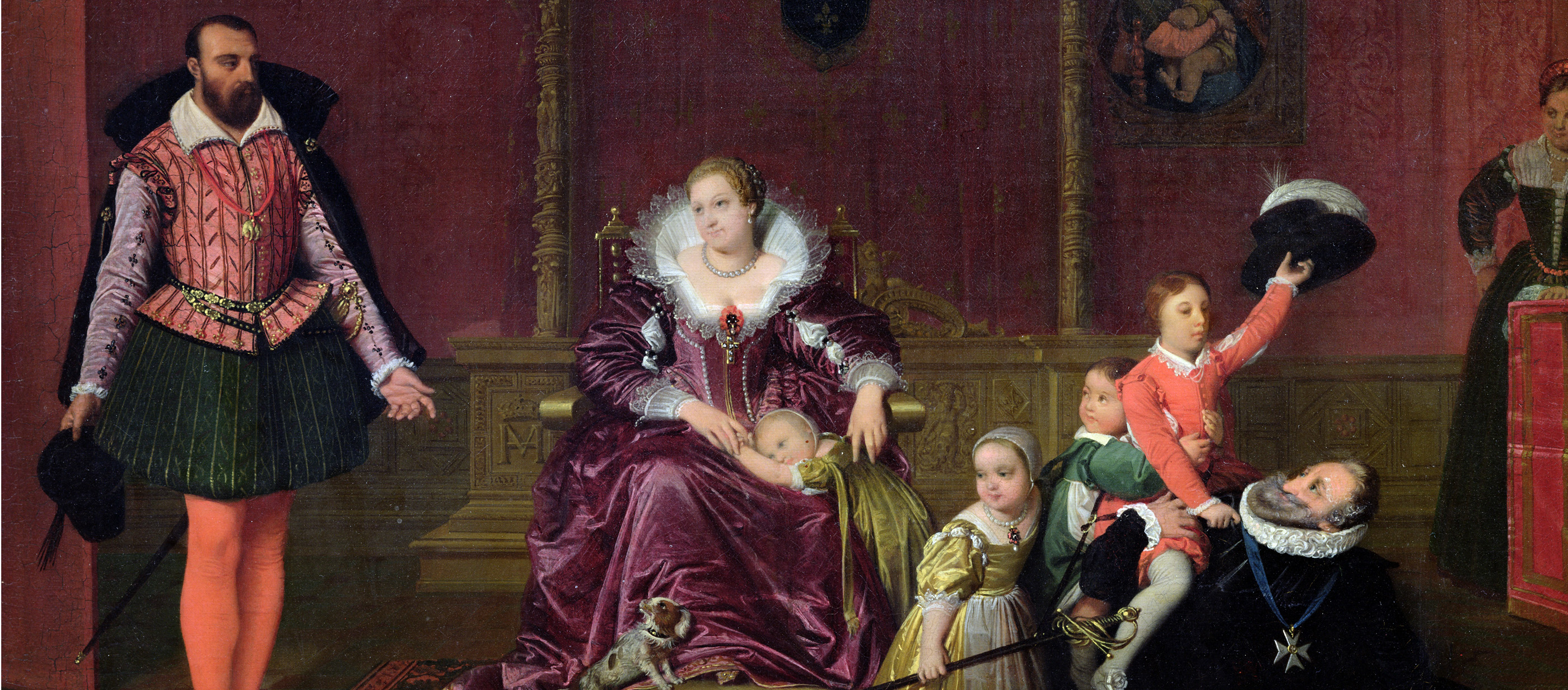
Henri IV Playing with His Children, by Jean-Auguste-Dominique Ingres, 1817. Petit Palais, Paris.
“Don’t you have a home?” Roslyn asks Gay when they’re driving around. “Sure,” he says, “Never was a better one, either.” “Where is it?” “Right here,” Gay says, and nods at the road and out at the desert. The camera shows us a stretch of land blurred by the speed of the drive: scrub brush, sand, and mountains. Sometimes the land looks grand, sublime, and inviting; on other viewings, it seems sadly desolate and empty, a kind of lie. Anyone who has ever been to Nevada knows the feeling of being divorced from everything, stuck between two sets of mountains, the time zones piling up between you and your family, everyone you once loved, and everything that once loved you. Roslyn’s response to Gay’s childlike faith in the open country—a place where you can “just live,” as he puts it in an earlier scene—seems to open into a void. Monroe’s face conjures a movie star’s well of loneliness, a wounded look that seems to stare out from the foster homes of Norma Jean’s own childhood.
“I don’t feel that way about you, Gay,” Roslyn says, and the next thing you know he is kissing her awake for breakfast. Eroticism becomes the great American balm for lonely hearts, the fake cure-all from the movies, from Marilyn. The characters in The Misfits try to fabricate an artificial tribe out of the magic dust of sexual alchemy and instant friendship in a broken-down void that isn’t even a frontier anymore. In the East, Miller’s characters cannot escape their fates because of their closely knit families, or because of events that loom out of the past to entrap parents and children. In the West, Miller’s characters are completely free but also completely unstuck, there’s too much room and nobody knows what to do. Maybe the East contains too much love and the West not enough—absolute freedom can be as terrifyingly lonely as family life can be cloying. At any rate, there’s no solution anywhere; the signs leading to the freeway or back home are pointing in different directions. “Well, you’re free,” Isabelle toasts Roslyn near the beginning of the film. “Maybe the trouble is you’re not used to it yet.” Or maybe the real trouble is that the heart cannot stand this kind of freedom.
The Misfits is regarded as an artistic and personal death-trap: in Hollywood lore, it is the picture that destroyed Miller’s marriage with Monroe through various infidelities, behind-the-scenes dramas, and on-set disasters. In fact, Monroe already had entered the abyss for good and would not complete another picture. After insisting on performing many of his own strenuous stunts in the desert heat, Gable died of heart failure soon after filming ended. Yet unlike the real-life background of the production, and very much unlike Miller’s best plays, the movie itself is desperate to conjure magic and restore belief in the possibility of a happy ending. “Gay,” Roslyn says, “if there could be one person in the world—a child who could be brave from the beginning…” Monroe had miscarried twice with Miller. According to Miller’s “cinema novel” version of The Misfits, “The love between them is viable, holding them a little above the earth.”
With no such narrative intrusions, the ending of the movie might feel more ambiguous:
Roslyn: How do you find your way back in the dark?
Gay: Just head for that big star straight on. The highway’s under it. It will take us right home.
We want to believe it can all work out, and so does Miller, at least he does here. This is sorrow-tinged, impossible wish-fulfillment, not just another manipulation cooked up by the studios. The Misfits is one of those movies that jumps right out of its frame, telling us almost everything we need to know about the movies, about the insecure relationship between writers and Hollywood, about what happened to the West, and maybe even about how the American Dream had gone wrong. Happy ending aside—Joyce Carol Oates in Blonde calls it a “fairy tale”—the movie contradicts itself. Actually, it doesn’t contain a lot of good news.
The Misfits’ portrayal of double-edged freedom from family ties in the West couldn’t be further removed from the tragic irony of the Lomans’ “free and clear” home ownership that draws the curtain in Death of a Salesman. When asked about his home, Gay gestures outside his truck at the desert. It’s the place that he’s taking Roslyn in the Hollywood happy ending of The Misfits. She’s told him that she’s ready to start a family. But, really, is there any reason to suspect that it will last longer than Gay’s previous marriage, the children of which run into their falling-down-drunk father at a rinky-dink rodeo? (Or any longer than Miller’s own marriage to Monroe, for that matter?) An Eastern family might be a self-poisoning well or a fouled nest, but The Misfits raises questions about what happens to American souls when they achieve the national dream of breaking loose from all moorings and drifting into a vast continent where nobody’s home. Which is a worse fate, to have a bad family or to have no family at all? The ending of The Misfits gives us a false or movie-dream solution to an enduring problem. It’s an answer we want to believe in but which we know is a temporary shelter at best, at worst a mirage—a mirage that surely will lead to the production of one more unhappy family.
